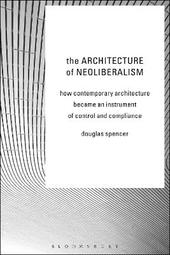
|
The Architecture of Neoliberalism: How Contemporary Architecture Became an Instrument of Control and Compliance
Hardback
Main Details
| Title |
The Architecture of Neoliberalism: How Contemporary Architecture Became an Instrument of Control and Compliance
|
| Authors and Contributors |
By (author) Douglas Spencer
|
| Physical Properties |
| Format:Hardback | | Pages:232 | | Dimensions(mm): Height 234,Width 156 |
|
| Category/Genre | Theory of architecture |
|---|
| ISBN/Barcode |
9781472581525
|
| Classifications | Dewey:720.1 |
|---|
| Audience | | Undergraduate | | Postgraduate, Research & Scholarly | | Professional & Vocational | |
|---|
| Illustrations |
30 B&W illus
|
|
Publishing Details |
| Publisher |
Bloomsbury Publishing PLC
|
| Imprint |
Bloomsbury Academic
|
| Publication Date |
20 October 2016 |
| Publication Country |
United Kingdom
|
Description
The Architecture of Neoliberalism pursues an uncompromising critique of the neoliberal turn in contemporary architecture. This book reveals how a self-styled parametric and post-critical architecture serves mechanisms of control and compliance while promoting itself, at the same time, as progressive. Spencer's incisive analysis of the architecture and writings of figures such as Zaha Hadid, Patrik Schumacher, Rem Koolhaas, and Greg Lynn shows them to be in thrall to the same notions of liberty as are propounded in neoliberal thought. Analysing architectural projects in the fields of education, consumption and labour, The Architecture of Neoliberalism examines the part played by contemporary architecture in refashioning human subjects into the compliant figures - student-entrepreneurs, citizen-consumers and team-workers - requisite to the universal implementation of a form of existence devoted to market imperatives.
Author Biography
Douglas Spencer teaches and writes on critical theories of architecture, landscape and urbanism. A regular contributor to Radical Philosophy, he has also written chapters for collections such as Architecture Against the Post-Political (2014), Landscape and Agency (2016) and This Thing Called Theory (2016). He has published numerous essays in journals such The Journal of Architecture, AD, AA Files, New Geographies, Volume and Praznine. He teaches at the AA's Graduate School of Design at the Architectural Association and at the University of Westminster, London.
ReviewsSpencer draws a direct intellectual lineage from neoliberalism's original thinkers through the unlikely corridors of late-20th-century countercultural and avant-garde thought, all the way into the glistening hallways of today's most acclaimed contemporary architectural firms. * Los Angeles Review of Books * This book marks a milestone in architectural criticism, and the questions it addresses could not be more important or urgent ... Its bold, unflinching description of architecture's complicity with the powers that be makes it an indispensable reference for all those concerned with the social and political meaning of their work, * Journal of Architectural Education * The Architecture of Neoliberalism is a devastating portrait of contemporary architecture as the phantasmagoria of neoliberal capitalism. Spencer deftly deconstructs the current architectural ideology as a melange of counter-cultural tropes and vitalist celebrations of flexibility, empowerment, spontaneity, and the market as the final arbiter of freedom. The result is a powerful plea for critique in the face of the architectural prophets who proclaim 'there is no alternative'. * Benjamin Noys, Professor of Critical Theory, University of Chichester, UK * "Neoliberalism" is commonly used as an epithet today to denounce a late-capitalist architecture in cahoots with the forces of real estate development and the marketplace. Douglas Spencer is the first to provide a detailed history of this term and to analyze its modes of operation, its architectural expressions, and its ideological subterfuges. An absolutely timely, lucid, important critique. * Joan Ockman, Distinguished Senior Fellow, University of Pennsylvania School of Design, USA * This book marks a milestone in architectural criticism, and the questions it addresses could not be more important or urgent. * JAE (Journal of Architectural Education) *
|